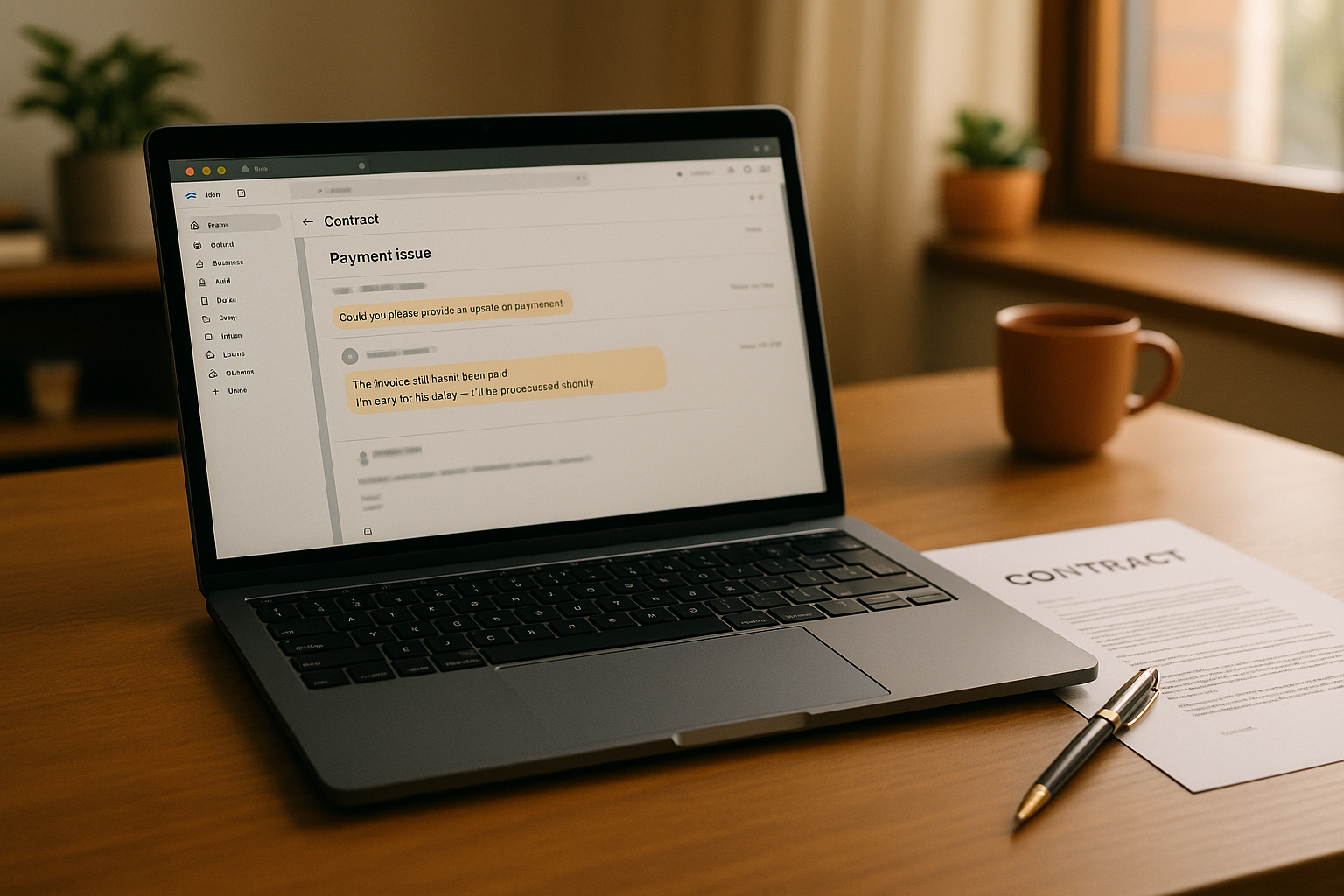Freelance payment disputes arise when clients and freelancers disagree over payment terms, deliverables, or the quality of work. These disputes can disrupt your income and create stress. Here’s how to prevent and resolve them effectively:
Key Takeaways:
- Why disputes happen: Miscommunication, unclear deliverables, time zone challenges, or cultural differences.
- How to prevent them: Use clear contracts, milestone-based payments, and regular communication.
- How to solve them: Start with open discussions, use documented evidence, and seek legal help if necessary.
Quick Tips:
- Set clear expectations upfront: Define the project scope, deliverables, and payment terms in writing.
- Use milestone payments: Break payments into smaller parts tied to specific deliverables.
- Document everything: Keep records of contracts, progress updates, and client communications.
- Act professionally in disputes: Focus on solutions, not blame. Use contracts and documentation to support your case.
- Legal options: Consider mediation or legal action only if other solutions fail.
By following these steps, you can protect your freelance income and build stronger client relationships.
Main Causes of Payment Disputes
Payment disputes in freelance work often stem from unclear project scopes. When deliverables are vague, both parties can interpret the completed work differently, leading to disagreements. This confusion highlights the importance of defining expectations early on. Clearly outlining the scope of work helps set a solid foundation for avoiding conflicts down the line.
How to Prevent Payment Disputes
Clear documentation and well-defined milestones are essential for maintaining transparency and building trust with clients. A milestone-based payment structure can help set clear expectations and reduce risks.
Setting Payment Milestones
Breaking payments into smaller, milestone-based segments lets both parties stay on track and manage the project more effectively. Here’s how to do it:
-
Define measurable outcomes for each milestone
For instance, you could divide the project into stages like:- Initial wireframes and mockups (25%)
- Homepage and main navigation development (25%)
- Secondary pages and features (25%)
- Final testing and launch (25%)
-
Set clear acceptance criteria
Specify how each milestone will be approved to avoid misunderstandings about the quality or scope of work. -
Establish realistic timelines
Provide enough time for review between milestones while ensuring the project maintains momentum. -
Schedule regular check-ins
Frequent updates help you address concerns early and ensure both parties remain aligned throughout the process.
Using a milestone-based approach can simplify the payment process and minimize disputes.
sbb-itb-574d71c
Steps to Resolve Payment Disputes
Handling payment disputes requires a clear and professional approach. Here’s a step-by-step guide to manage conflicts effectively:
Initial Client Discussion
Start by contacting your client to address concerns and prevent the situation from escalating. During this discussion:
- Review deliverables and milestones to ensure alignment on project expectations.
- Listen carefully to identify any misunderstandings or miscommunications.
- Document everything with follow-up emails summarizing the conversation.
- Focus on finding solutions rather than assigning blame.
“Let’s review the completed deliverables against our agreed-upon milestones to ensure we’re aligned on the project status.”
If these initial talks don’t resolve the issue, having detailed documentation can help support your case.
Using Contract Evidence
Your contract and project records are essential tools for demonstrating that you’ve fulfilled your obligations. Here’s how different types of documentation can help:
| Documentation Type | Purpose | Key Elements |
|---|---|---|
| Contract | Outlines the legal agreement | Scope, payment terms, deliverables |
| Progress Reports | Shows work completion | Milestones achieved, client approvals |
| Communication Records | Provides project history | Emails, meeting notes, change requests |
| Deliverable Approvals | Confirms client acceptance | Sign-offs, feedback, revision history |
These records can clarify your position and demonstrate that you’ve met your responsibilities.
When to Seek Legal Help
If discussions and documentation don’t resolve the issue, legal assistance might be necessary. Consider legal action in these situations:
-
Substantial Disputed Amount
When the amount in question justifies the cost of legal proceedings. -
Repeated Communication Failures
If multiple attempts to resolve the issue directly have been unsuccessful. -
Clear Contract Breach
When the client has clearly violated agreed-upon terms.
Before taking legal steps, explore mediation services offered by freelance platforms or professional organizations. Mediation can often provide a more affordable and less confrontational solution.
Conclusion: Protecting Your Freelance Income
Key Steps to Safeguard Your Earnings
To secure your freelance income, start with a solid contract. This document should clearly define the project scope, deliverables, and payment terms. Including payment milestones tied to specific deliverables can help ensure consistent cash flow throughout the project.
Here are some essential contract elements to include:
| Element | How to Apply | Why It Helps |
|---|---|---|
| Clear Scope | Outline all deliverables in detail | Avoids disagreements over extra work |
| Change Management | Require written approval for changes | Keeps track of project adjustments |
| Late Payment Penalties | Define fees for overdue payments | Motivates clients to pay on time |
Streamlining Your Workflow
Beyond preventive measures, improving your workflow can make a big difference. Create standardized processes to enhance efficiency and reduce misunderstandings. For example:
- Templates for documents: Use pre-made formats for contracts, reports, and payment schedules.
- Regular communication: Schedule consistent check-ins to keep everyone on the same page.
- Automated payments: Use digital tools to speed up payment processing.
Maintaining detailed records for each client also helps resolve potential disputes and strengthens your professional relationships over time.
FAQs
How can I set clear expectations with clients to prevent payment disputes?
To prevent payment disputes, start by creating a detailed contract that outlines key terms, including payment schedules, deliverables, and deadlines. Ensure both parties agree on the scope of work and any potential extra charges for revisions or additional tasks.
Maintain open communication throughout the project. Regular updates help ensure both you and your client are on the same page, reducing misunderstandings. Finally, use professional invoicing tools to clearly itemize charges and set clear payment terms, such as due dates and accepted payment methods (e.g., USD).
What should freelancers do if a client disputes the quality of their work, even with a clear contract in place?
When a client disputes the quality of your work, even with a clear contract, it’s important to stay professional and address the issue calmly. Start by reviewing the contract and any documentation to ensure you’ve met the agreed-upon terms. Communicate openly with the client to understand their concerns and provide evidence, such as drafts, emails, or feedback, that supports the quality of your work.
If the issue remains unresolved, consider offering a compromise, like minor revisions, to maintain a positive relationship. For serious disputes, you may need to involve a mediator or seek legal advice, especially if the payment is significant. Always aim to prevent future disputes by setting clear expectations upfront and maintaining thorough records of all agreements and communications.
When should a freelancer consider legal action over a payment dispute, and what steps should they take first?
Legal action should only be considered as a last resort in payment disputes, after all other efforts to resolve the issue have been exhausted. Before taking this step, freelancers should:
- Communicate clearly: Reach out to the client with a polite but firm follow-up, outlining the outstanding payment and referencing any agreed-upon terms.
- Review contracts: Double-check the signed agreement to confirm the payment terms and any dispute resolution clauses.
- Send a formal demand letter: If communication fails, draft a professional demand letter requesting payment by a specific deadline. This can often prompt action without escalating further.
If these steps don’t resolve the issue, consulting a legal professional or small claims court may be necessary. Always keep detailed records of your communications and agreements to strengthen your case.



